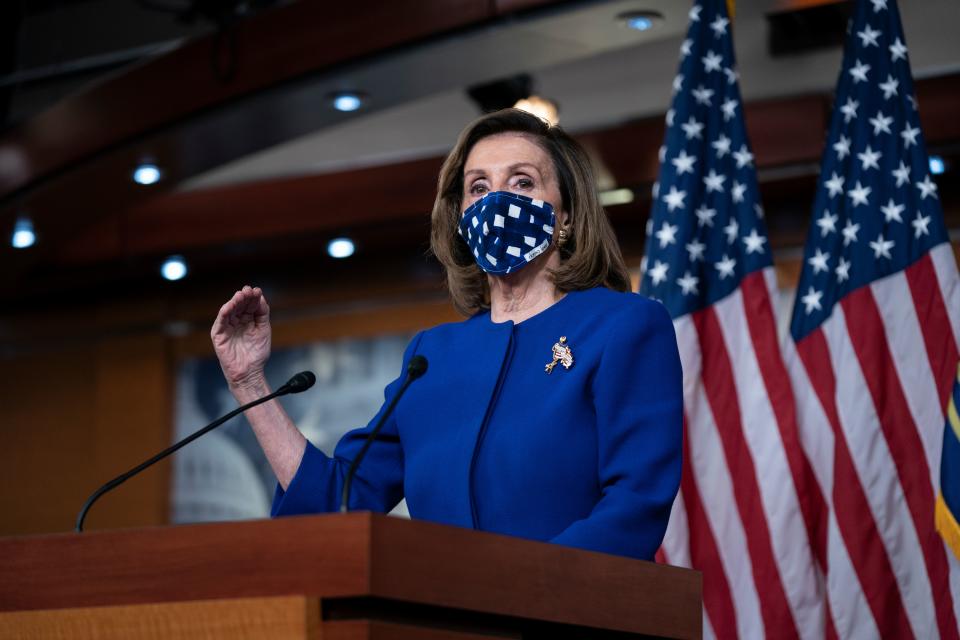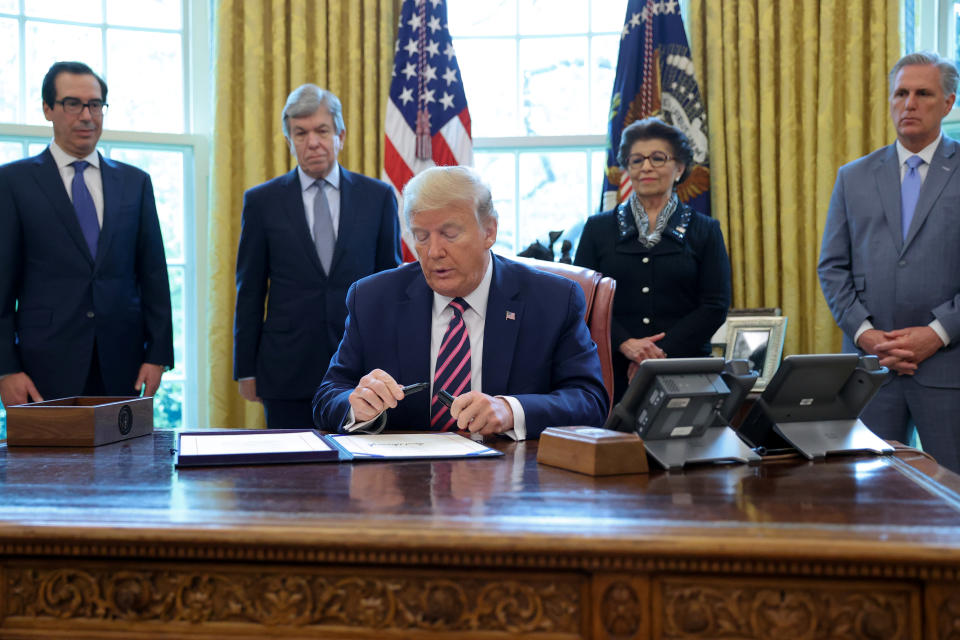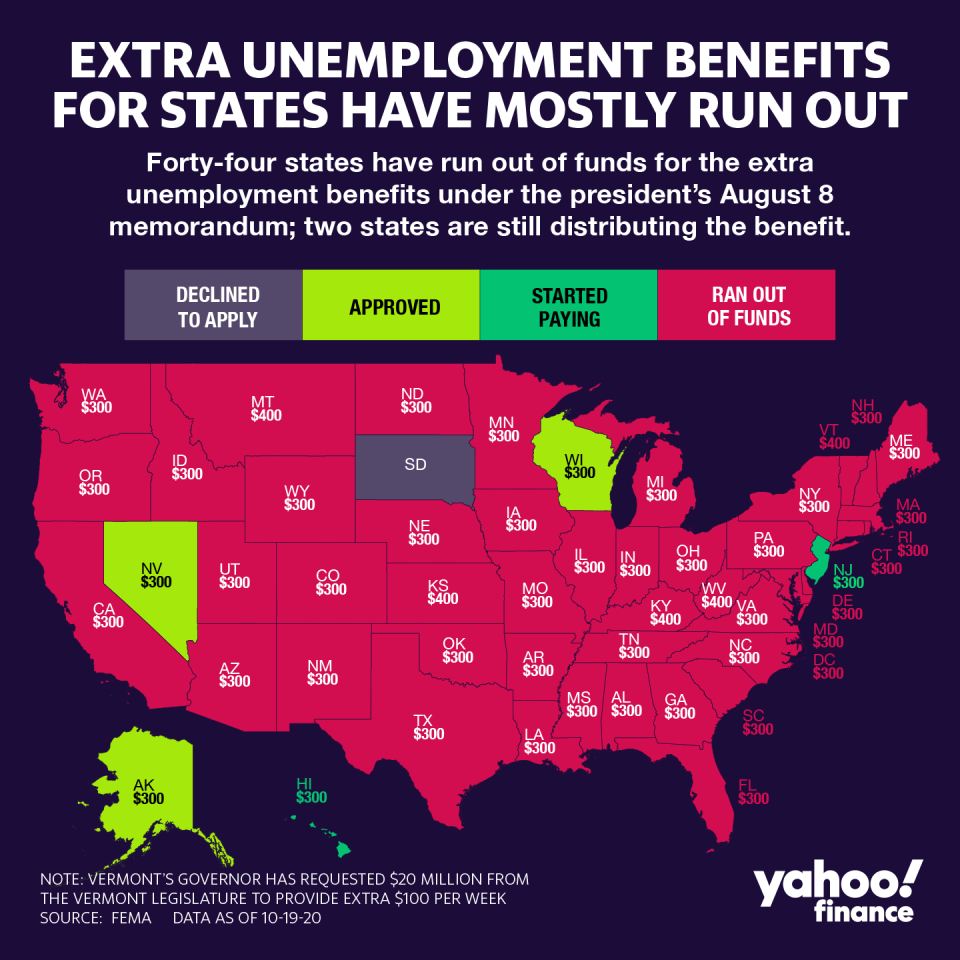Stimulus deal signed by President Trump before election increasingly unlikely as time runs out
Hopes for a stimulus deal before the election are fading fast.
While Speaker Nancy Pelosi (D-CA) said Thursday that she and Treasury Secretary Steven Mnuchin are “just about there” on a package worth between $1.9 and $2.2 trillion, it may be too late for a bill to get through all the government hoops before November 3, experts said.
“If a deal is reached, I still think the likely outcome is we're not going to have words on paper that pass the House,” Mark Harkins, a former congressional staffer and senior fellow at Georgetown’s Government Affairs Institute told Yahoo Money. “If we do have words on paper that passed the House, I think it's very likely that McConnell is not going to bring it up.”

Three months after the negotiations began, Pelosi and Mnuchin have come closer on the top line of the deal, but key disagreements remain. Committee chairs in the House and Senate now are involved, trying to resolve differences about funding and language.
“We put pen to paper, we're writing the bill and hopefully we'll be able to resolve some of the objections,” Pelosi told MSNBC on Friday.
Read more: Here’s what you need to know about unemployment benefits eligibility
But with so little time left, the bill won’t be able to be sent back and forth to the House and Senate for amendments, according to Harkins.
“The staff has to agree to everything ahead of time,” he said. “They're going to want a final bill that's already pre-arranged, that passes one body, goes to the other body, and then passes.”
Then, the House Rules Committee has to put up the legislation, which must be available for lawmakers to review for 72 hours before they can vote on it. That means, in the best case scenario, the bill could pass the House floor on October 27 at the earliest.
‘Unless he believes there are 26 Republicans who are going to vote’
While the legislation would likely pass the Democratic-controlled House, the next hurdle would be putting it for a vote in the Senate. It would need 60 votes to pass the Senate, meaning at least 13 Republican senators would have to vote in favor of the legislation. But more may be needed for the bill to even be considered before the election, Harkins said.
“This only happens if McConnell believes half of his caucus at least is going to vote for it,” he said. “Unless he believes there are 26 Republicans who are going to vote for this, he's not going to even bring it up for a vote.”

McConnell agreed to put a bipartisan deal to a vote in the Senate — despite opposition from his party — but didn’t specify whether that will happen before or after the election.
“If a presidentially supported bill clears the House, at some point, we’ll bring it to the floor,” McConnell told reporters on Tuesday.
Read more: How long will your unemployment benefits last?
If all this happens, the earliest the legislation can be put for a vote in the Senate would be October 29, but more likely October 30 because it would likely be subject to filibuster, which extends the process by another 30 hours.
If there’s a second filibuster, the final vote in the Senate may move to Saturday, October 31, or Sunday, November 1.
Many Republican senators have expressed concerns about the price tag of the potential deal, raising questions whether enough Republican senators would support it.
“It’s about the president of the United States engaging in a discussion,” Pelosi told reporters on Thursday. “That’s up to him to deliver [on] what can happen on the Senate side.”

‘The Monday before the election?’
Even if the bill passes the Senate and gathers 60 votes, it would be delivered to the White House between October 31 and November 2, which may be too late for the president to sign before the election.
“The Monday before the election?” Harkins said. “Who's going to campaign on that?”
The president has been vocal about supporting a stimulus deal, even saying that he would go above the $2.2 trillion proposal from the Democrats.
But he also weighed in on a tweet on Wednesday, saying he doesn’t see a way Democrats “will be willing to do what is right for our great American workers” and that they’re too focused on funding for state and local governments.
The president has 10 days to decide whether to sign the deal. A possible election loss could mean he may decide not to sign the deal.
“The president can still decide not to sign it until after the election and just hold it hostage,” Harkins said, “and basically, say, ‘All these goodies you get, but only if I'm reelected.’”
Denitsa is a writer for Yahoo Finance and Cashay, a new personal finance website. Follow her on Twitter @denitsa_tsekova.
Read more:
Follow Yahoo Finance on Twitter, Facebook, Instagram, Flipboard, SmartNews, LinkedIn, YouTube, and Reddit.

 money
money 

